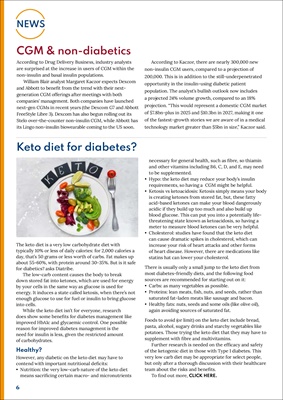
6
NEWS
Keto diet for diabetes?
CGM & non-diabetics
According to Drug Delivery Business, industry analysts
are surprised at the increase in users of CGM within the
non-insulin and basal insulin populations.
William Blair analyst Margaret Kaczor expects Dexcom
and Abbott to benefit from the trend with their nextgeneration
CGM offerings after meetings with both
companies' management. Both companies have launched
next-gen CGMs in recent years (the Dexcom G7 and Abbott
FreeStyle Libre 3). Dexcom has also begun rolling out its
Stelo over-the-counter non-insulin CGM, while Abbott has
its Lingo non-insulin biowearable coming to the US soon.
According to Kaczor, there are nearly 300,000 new
non-insulin CGM users, compared to a projection of
200,000. This is in addition to the still-underpenetrated
opportunity in the insulin-using diabetic patient
population. The analyst's bullish outlook now includes
a projected 24% volume growth, compared to an 18%
projection. "This would represent a domestic CGM market
of $7.8bn-plus in 2025 and $10.3bn in 2027, making it one
of the fastest-growth stories we are aware of in a medical
technology market greater than $5bn in size," Kaczor said.
The keto diet is a very low carbohydrate diet with
typically 10% or less of daily calories: for 2,000 calories a
day, that's 50 grams or less worth of carbs. Fat makes up
about 55-60%, with protein around 30-35%. But is it safe
for diabetics? asks Diatribe.
The low-carb content causes the body to break
down stored fat into ketones, which are used for energy
by your cells in the same way as glucose is used for
energy. It induces a state called ketosis, when there's not
enough glucose to use for fuel or insulin to bring glucose
into cells.
While the keto diet isn't for everyone, research
does show some benefits for diabetes management like
improved HbA1c and glycaemic control. One possible
reason for improved diabetes management is the
need for insulin is less, given the restricted amount
of carbohydrates.
Healthy?
However, any diabetic on the keto diet may have to
contend with important nutritional deficits:
• Nutrition: the very low-carb nature of the keto diet
means sacrificing certain macro- and micronutrients
necessary for general health, such as fibre, so thiamin
and other vitamins including B6, C, D, and E, may need
to be supplemented.
• Hypo: the keto diet may reduce your body's insulin
requirements, so having a CGM might be helpful.
• Ketosis vs ketoacidosis: Ketosis simply means your body
is creating ketones from stored fat, but, these fatty
acid-based ketones can make your blood dangerously
acidic if they build up too much and also build up
blood glucose. This can put you into a potentially lifethreatening
state known as ketoacidosis, so having a
meter to measure blood ketones can be very helpful.
• Cholesterol: studies have found that the keto diet
can cause dramatic spikes in cholesterol, which can
increase your risk of heart attacks and other forms
of heart disease. However, there are medications like
statins hat can lower your cholesterol.
There is usually only a small jump to the keto diet from
most diabetes-friendly diets, and the following food
sources are recommended for starting out on it:
• Carbs: as many vegetables as possible.
• Proteins: lean meats, fish, nuts, and seeds, rather than
saturated fat-laden meats like sausage and bacon.
• Healthy fats: nuts, seeds and some oils (like olive oil),
again avoiding sources of saturated fat.
Foods to avoid (or limit) on the keto diet include bread,
pasta, alcohol, sugary drinks and starchy vegetables like
potatoes. Those trying the keto diet that they may have to
supplement with fibre and multivitamins.
Further research is needed on the efficacy and safety
of the ketogenic diet in those with Type 1 diabetes. This
very low carb diet may be appropriate for select people,
but only after a thorough discussion with their healthcare
team about the risks and benefits.
To find out more, CLICK HERE.